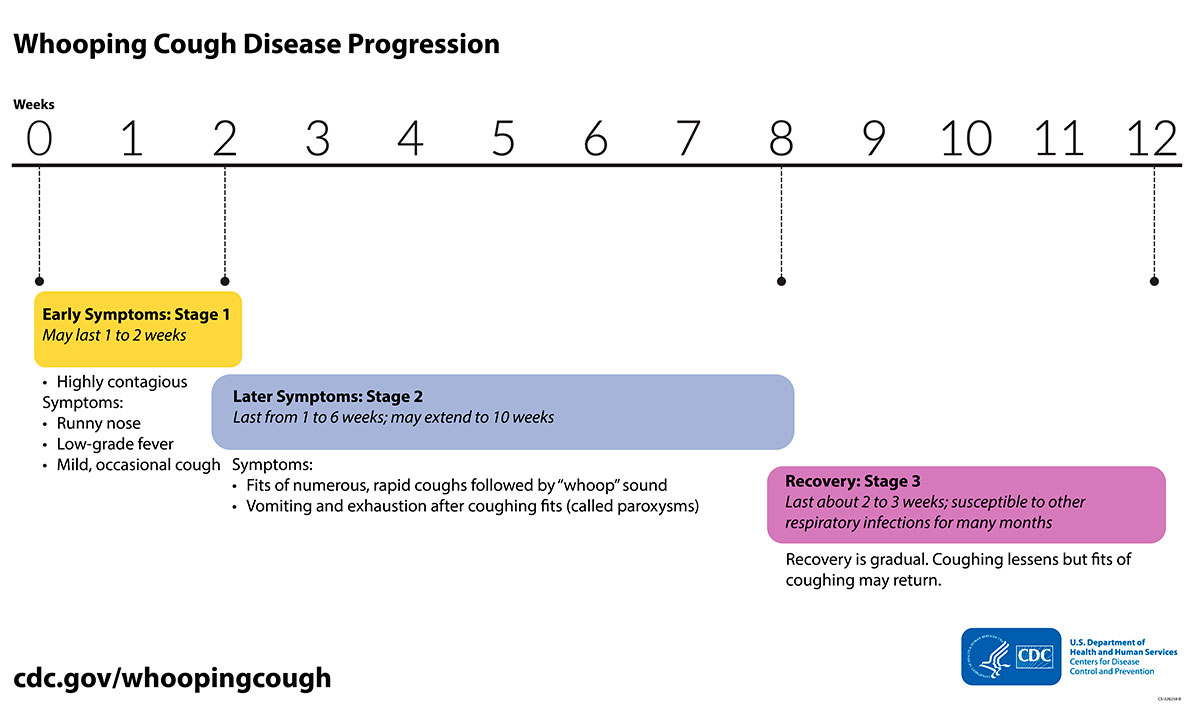Pertussis
Pertussis, also called “whooping cough”, is an upper respiratory infection caused by the Bordetella Pertussis bacteria and is recognized for the high-pitched “whoop” sound that occurs after coughing. It is highly contagious and spreads easily from person to person in the air through droplets when an already infected person coughs or sneezes. Pertussis affects people of all ages but causes the most severe symptoms in infants. Teens and adults with pertussis may not have the characteristic “whoop” seen in infants and young children but may instead present with violent coughing fits extending over a prolonged period.
Since the 1980s, there has been a significant increase in the number of pertussis cases in teens and young adults. This is due to decreased vaccination rates in some communities and waning vaccine-induced protection that occurs 8-10 years after the last Tdap, which is typically given at 11-12 years of age. College students are particularly prone to whooping cough due to frequent contact with others on a daily or near daily basis, many of whom have not had an updated Tdap vaccination while in college.
Symptoms
Initial symptoms appear about 5-10 days after exposure but could take as long as 3 weeks to develop. Early symptoms typically last 1-2 weeks and include: runny/stuffy nose, low grade fever (less than 38°C or 100.4°F), sore throat, watery eyes, and mild occasional cough. Since these symptoms are similar to the common cold, whooping cough isn’t usually suspected or diagnosed until more severe symptoms appear.
One to 2 weeks after the initial symptoms start, the paroxysms or coughing fits begin. These episodes are often rapid, violent, and uncontrollable. During this time, thick mucus in the airways may also develop. This stage of whooping cough usually lasts 1-6 weeks but can linger for as long as 10 weeks. The coughing fits generally get worse and become more common as the illness progresses before leveling off and then gradually slowing down. Following the paroxysms, people may vomit, feel very tired/fatigued, struggle to breathe or catch their breath, have difficulty sleeping, or break ribs (from forceful coughing).
Gradual recovery for pertussis can last up to 6 weeks. The coughing fits should resolve but may leave behind a mild cough that comes and goes and eventually happens less and less. During this period, people recovering from whooping cough are more susceptible to other respiratory infections. It is important to take preventative measures to avoid exposure to germs because if another illness is acquired, the coughing fits may recur.

Complications
Infants younger than 1 year old are at the greatest risk of getting whooping cough and developing severe complications and are the most likely to be hospitalized. People with pre-existing health conditions such as immunocompromising conditions and asthma are also at high risk for developing a severe infection. Additionally, pertussis can cause other conditions such as nosebleeds, ear infections, pneumonia, nutritional deficiencies, migraines, and rib injuries.
When to Seek Care
Whooping cough can be difficult to diagnose since the symptoms are similar to other respiratory illnesses. People should seek medical evaluation if they were exposed to whooping cough, have symptoms of whooping cough, develop new or unexplained symptoms, or have chest pain when coughing or taking a deep breath. Anyone at risk of developing severe illness and/or complications is encouraged to contact their medical provider immediately.
Treatment
Whooping cough is generally treated with antibiotics to keep infected people from spreading the bacteria to others and lessen illness severity. Antibiotics will not stop or prevent the coughing fits or help the cough go away. Additionally, starting treatment for pertussis after 3 or more weeks of illness is unlikely to be beneficial, even though most people will still have symptoms. By this point, the actual infection is gone, and the ongoing symptoms are a result of airway damage and take time to heal.
Symptoms of whooping cough can be managed at home by avoiding irritants such as smoke, dust, or chemical fumes, using a cool mist humidifier to loosen mucus and soothe the cough, eating small meals every few hours to prevent vomiting, resting, and staying hydrated by drinking plenty of fluids. Cough medicine is not recommended for whooping cough and should not be used unless under the direction of a medical provider.
Prevention
The best way to prevent whooping cough is to get vaccinated; however, people who’ve been vaccinated can still get whooping cough, but the illness is generally milder. The Centers for Disease Control (CDC) recommends whooping cough vaccination for everyone. See CDC Pertussis Vaccine recommendations for more. Practicing good hand hygiene can also prevent the spread of bacteria and viruses that cause many respiratory illnesses.
Resources
